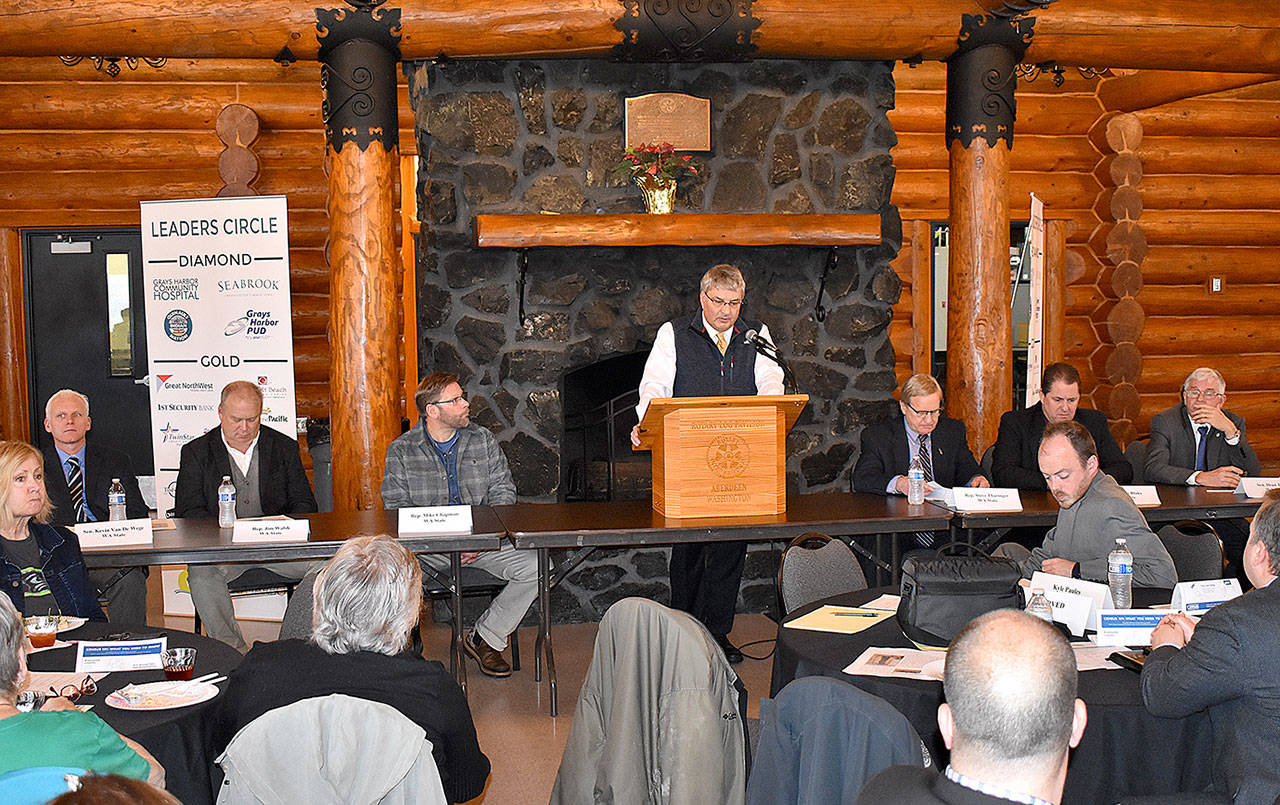The 2020 Legislative session kicks off Monday, and a topic that will rise to the top during the 60-day session will be funding critical transportation projects after the passage of Initiative 976, the $30 car tab measure that will reduce revenue that funds the state’s transportation budget.
The passage of the initiative put “a big hole in local and state transportation funds,” said 24th District Sen. Dean Takko, D-Longview, at the Greater Grays Harbor legislative send-off luncheon held at the Rotary Log Pavilion in Aberdeen Friday.
Senators and representatives from the 19th and 24th districts, known collectively as the Coastal Caucus, were on hand to weigh in on some of the big issues for the upcoming 60-day session.
“The people told us they wanted $30 car tabs,” said 19th District Rep. Jim Walsh, R-Aberdeen. He said the vote told him the people wanted the state transportation budget looked at closely and reshaped. He said it’s possible to do that in a way that needed projects won’t have to be cut.
He suggested diverting more tax revenue from new vehicle purchases out of the general fund and into the transportation budget. He also suggests the Department of Transportation “tighten their belts and find efficiencies” to better manage its funds. He said current projects should not be cut, nor should transit services for “high needs individuals.”
Walsh said it’s part of his job as a legislator to follow the will of the people and follow the car tab initiative, even while its provisions are tied up in court. Rep. Mike Chapman, D-Port Angeles, said that’s not always so simple, and said the $30 car tab initiative was “a really bad deal for rural Washington.” Car tab fees fund things like fish passage projects and transporation infrastructure that bring jobs to rural areas, he said.
While voters in Walsh’s 19th District which goes from Aberdeen to Longview, heavily favored the Tim Eyman sponsored $30 car tab initiative, Chapman represents the 24th District, which stretches north from Hoquiam to the top of the Olympic Peninsula and the message from that district was ambiguous.
24th District voters in Grays Harbor County soundly supported the initiative, while voters in Clallam County were split about 50-50, and those in Jefferson County were staunchly against the measure.
Chapman also said more state spending for transportation comes to his district than taxpayers contribute. For every dollar spent on things like car tabs, the district sees a return of about $1.20, compared to about 80 cents for those in more populated areas, he said.
Walsh made a point of saying lawmakers should honor the wishes of voters. Takko challenged him, saying Walsh was all for upholding the will of the people on Initiative 976, but questioned why Walsh didn’t do so with Initiative 1639, the broad gun laws measure that passed in 2018. Walsh has been a staunch critic of that initiative and has been vocal against it since its passage.
Walsh countered it was his job to interpret the vote of his constituents and apply it to the legislation he drafts.
Several of the legislators talked about finding ways to end the inequity that exists in school funding, saying the current system favors more populated districts while leaving rural districts in the lurch and the changed funding formulas following the McCleary decision on public schools made it worse in some cases.
24th District Rep. Brian Blake, D-Aberdeen, said he was “upset” with the recent marbled murrelet plan by the Department of Natural Resources Board that scales back timber harvests, which “hampers the ability to fund school construction.”
There was talk about a forest carbon bill that would consider the value of timber lands in climate change legislation. “The cool thing about this bill is that the forest product industry will become part of the carbon discussion,” said 19th District Sen. Kevin Van De Wege, D-Sequim.
Dru Garson, Greater Grays Harbor CEO, asked the legislators about the issue of homelessness, which according to a recent Elway poll is at the forefront of voters’ concerns. 24th District Rep. Steve Tharinger, D-Sequim, said he is looking at ways to streamline the way state housing trust fund money can get to those who need it, and ways to help smaller projects gain access to tax credits that can expedite the creation of affordable housing.



